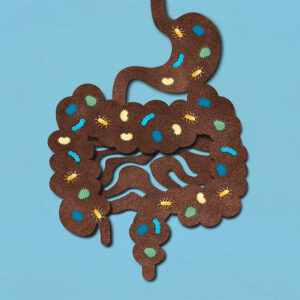
Chronic “Fight or Flight” Mode Harms Your Health
Let me tell you a tale about a little part of our brain that can cause us a LOT of trouble…
It’s called the amygdala.
And while it’s small, it has a massively important job.
The amygdala is where most decisions are made about how to react to potential dangers in the environment.
Its primary job is to keep feelings like fear and anger in check UNTIL the body senses a threat. Then it springs into action.
But this ancient part of the brain faces challenges in our modern world.
When you’re in danger, the amygdala comes out swinging. It makes you feel scared and angry until you escape from the threat.
The amygdala will keep up the fight as long as the threat remains. But here’s the problem: threats have changed over the years.
Your ancient ancestor might have fought off a saber-toothed tiger or engaged in hand-to-hand combat against a neighboring tribe.
But once the threat had passed, their parasympathetic nervous system “applied the brakes,” dialing down the stress response (more on this in a moment). And their body’s systems returned to normal.
In today’s society, we’re sometimes faced with multiple “threats” a day. Something as simple as a distracted driver, an angry boss, walking down a dark street, or an upsetting social media post can activate your amygdala.
In other words, we’re STUCK in fight or flight mode a LOT of the time. And that puts a lot of stress on the body as it prepares for whatever may come.
- The hormone epinephrine surges through your body.
- Your heart beats faster, pushing blood to your heart, muscles, and vital organs.
- Your blood pressure and pulse rate rise.
- You breathe more rapidly, and your lung’s airways expand.
- Your senses become sharper.
- Glucose and fat are released, giving you extra energy.
If you need to dodge a punch or jump out of the path of a speeding train, thanks to your amygdala, you can. In fact, all those changes allow you to do it without even having to think.
But if the stress response never gets switched off, you can eventually end up battling the health problems that come with chronic stress.
Chronically elevated epinephrine can damage arteries and blood vessels, boosting blood pressure and raising your risk of heart attack and stroke. And the stress-hormone cortisol can trigger overeating, fat storage, and unhealthy weight gain.
In a way, your amygdala works harder in today’s manmade environment than it ever would in the natural world.
But the good news is there IS a way to put your amygdala to sleep. And it couldn’t be simpler. All you have to do is take a stroll through a primarily green or blue area..
Head outdoors and find someplace where lots of green things are growing, or there’s a large body of water (or better yet, both). Spending as little as 30 minutes in a natural setting can help calm the amygdala.
So, to flip your amygdala’s switch into sleep mode, spend some time every week communing with nature.
P.S. Discover how spending more time near a greenway, forest, or park (green spaces) OR a lake, ocean, or other waterways (blue spaces) can literally keep you OUT of the hospital. I’ve got the scoop RIGHT HERE.
Written By Dr. Scott Olson, ND
Nearly 25 years ago, failed mainstream medical treatments left Dr. Olson in constant pain – and his health in ruins. And that’s when he did something REVOLUTIONARY. He began his career in medicine – and dedicated his life to uncovering the true, underlying causes of disease.
Through his innovative medical practices in Tennessee and Colorado, Dr. Olson has helped cure countless seniors from across America of arthritis… heart disease… diabetes… and even cancer. All without risky prescription drugs or painful surgeries.
View More Free Articles
Losing Your Locks? The SURPRISING Solution
There’s no way to sugarcoat it. Losing your hair sucks. The hit to your self-esteem is no joke. You might even find yourself avoiding mirrors and hoarding hats. The treatment options are limited, often come with a laundry list of side effects, and deliver results that are about as predictable as a coin flip. It’s...
REAL Drug-Free Back Pain Relief
Recently, I’ve had several exasperated people ask me, “Is back pain something I just have to live with?” I battled chronic back pain for years, so I completely understand why some folks feel so hopeless about finding relief. In fact, I used to think I was doomed to a life of pain and limitations, too....
Mailbag: When to Worry About Memory Lapses
“I’ve been experiencing some memory lapses recently, and I’m worried it might be early signs of Alzheimer’s disease. My mother also had it. What symptoms should I look out for?” – Ann Hi Ann, It’s important to recognize that some degree of memory loss is a normal part of life. Our brains constantly process and...
The Unforeseen Link Between Your Gut and Your Waistline
As the weather warms up and summer approaches, many of us start thinking about shedding those extra pounds… We dust off our gym memberships, stock up on salad greens, and vow to finally fit into those shorts from last year. But what if I told you that the key to achieving a healthy weight might...
Defy Aging with the Sunshine Vitamin
If there’s one thing you absolutely must do for your health, it’s to maintain healthy vitamin D levels. I can’t stress this enough. And if you think vitamin D is only good for beefing up your bones, think again. Because while vitamin D is crucial for maintaining healthy bones, recent research has revealed that this...
Detox Your Drinking Water with a Microplastics Purge
We’re surrounded by plastics. They’re everywhere, from the obvious plastic shampoo bottle to the not-so-obvious clothing on our backs. From the moment we get up in the morning until we slide beneath the sheets at night, we are in contact with them. Heck, some bedsheets contain plastic fibers, so you may ALSO be exposed while...
The TRUTH About Word Finding Troubles
Picture this. You’re having a lively conversation with a friend, and suddenly, find yourself grasping for a word that’s just out of reach. You KNOW it’s in there somewhere, hiding in the recesses of your mind. But no matter how hard you try, you can’t seem to pin it down. When you have trouble word...
FDA Finally Admits “BANNED” Soda Ingredient is Unsafe
I’m not a soda fan for MANY reasons. I wrote an entire book on the dangers of sugar, for example. And research links soda drinking to fatty liver disease, heart disease, high blood pressure, diabetes, obesity, and Alzheimer’s. And the diet stuff is no better. Fake-sugar-filled diet sodas cause “metabolic confusion,” and artificial sweeteners are...
Discover WHY We Accidentally Overeat (and How to Stop)
Picture this… You finish eating a nice meal feeling just fine. But then, 20 minutes later, you’re groaning and clutching your belly because you feel uncomfortably stuffed. If this sounds familiar, you’re in good company. Most of us have had this happen. Science reveals why accidental overeating occurs… and what we can do to avoid...
Find Exercise Exhausting and Painful? Try THIS Natural Fix
If you’ve heard it once, you’ve heard it a thousand times: “You need to exercise.” And sure, you know how vital it is to healthy aging. But let’s be honest, sometimes it feels nearly impossible to get moving—especially when you know you’ll be sore for DAYS after. However, hold on to your seat because I’ve...









